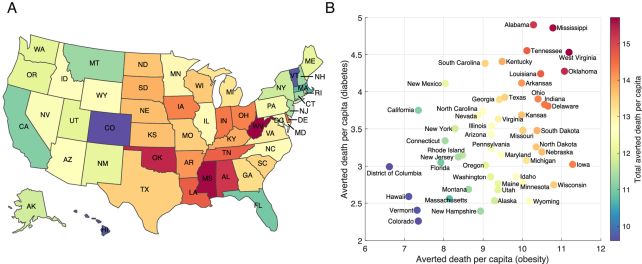The lives of Individuals may very well be dramatically improved, and in hundreds of instances even saved, by rising entry to weight-loss medication, scientists at Yale and the College of Florida have discovered.
At present entry ranges, an estimated 8,592 lives – largely amongst sufferers who’ve non-public insurance coverage – can be saved every year. Entry to medication resembling semaglutide (offered as Ozempic and Wegovy) and tirzepatide (Zepbound), that are seeing rising recognition for help in extra weight discount, may lower the annual loss of life charge within the US by an estimated 42,027 extra individuals.
“Expanding access to these medications is not just a matter of improving treatment options but also a crucial public health intervention,” says epidemiologist Alison Galvani of the Yale Faculty of Public Well being. “Our findings underscore the potential to reduce mortality significantly by addressing financial and coverage barriers.”
The US is within the throes of an weight problems disaster. In accordance with the CDC, some 73.6 % of American adults are chubby, with a physique mass index (BMI) at or over 25. That features the 41.9 % of Individuals which can be thought of overweight, with a BMI at or over 30.
Weight problems is linked with an elevated threat of a complete vary of significant well being issues, resembling heart problems, coronary heart failure, liver illness, despair, most cancers, stroke, and diabetes, all of which might shorten a affected person’s lifespan.
Led by epidemiologist and information scientist Abhishek Pandey of Yale College, a workforce of scientists got down to quantify the affect of increasing entry to weight-loss medication on the US mortality charge from many of those obesity-related ailments.
They created a map of the BMI distribution throughout the US, and cross-referenced it with the share of Individuals who’re at present capable of entry weight-loss prescriptions. This allowed them to precisely quantify the mortality charge from obesity-related issues immediately attributable to an absence of entry to those prescriptions.
“Limited access stems from a combination of financial barriers, supply constraints, and restrictive insurance coverage,” the researchers write of their paper.
“Although insurance typically covers these medications for diabetes treatment, coverage for weight-loss is less consistent, often requiring patients to pay out-of-pocket or face restrictive insurance policies. Furthermore, 25.6 million Americans are uninsured and more than 80 million are inadequately insured. Currently those uninsured with diabetes or obesity have no access to these innovative weight-loss drugs, and access is challenging even for those with coverage.”
They decided that, if everybody who ought to be eligible for weight-loss prescriptions was capable of receive one, the weight problems charge within the US would fall to 38 %, and greater than 50,000 lives can be saved yearly.

That is the best-case situation, during which neither price nor provide are boundaries to entry. Even with these boundaries in place, nevertheless, elevated entry would dramatically cut back the mortality charge from weight problems comorbidities, together with a discount in deaths from kind 2 diabetes by 11,769 individuals.
The US touts itself as one of many richest nations on the planet, however the research highlights that, despite the nation’s wealth, being poor can nonetheless kill you. The researchers consider that steps ought to be taken to handle this devastating disparity.
“We need to ensure that drug prices are more aligned with manufacturing costs and increase production capacity to meet demand,” explains mathematician Burton Singer of Yale College. “At the same time, we must tackle the insurance and accessibility issues that prevent many people from getting the treatment they need.”
The analysis has been revealed within the Proceedings of the Nationwide Academy of Sciences.

